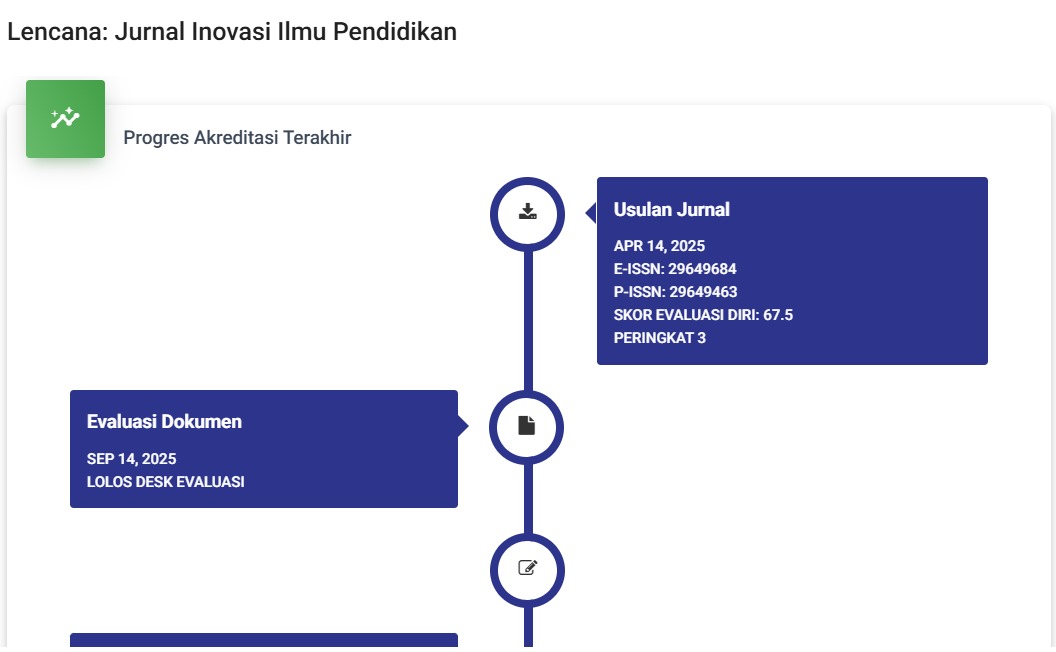Penerapan Kecerdasan Majemuk Dalam Pembelajaran
DOI:
https://doi.org/10.55606/lencana.v1i4.2255Keywords:
Multiple Intelligence, Learning ProcessAbstract
This study aims to understand the latest developments in 21st century education with a focus on the theory of multiple intelligences, educational technology, and the values of social justice and equity. Through the method of literature review, this study found that inclusive and holistic approaches in education are increasingly important. The theory of multiple intelligences became popular as a response to this need, valuing the diversity of intelligences in the process of teaching and learning. Educational technology and games have also been shown to support soft skill development and student participation. The values of social justice and equity emerge as important elements in educational practices and policies. This study suggests further research on optimizing practices based on the theory of multiple intelligences, the effectiveness of technology-based educational games, and the integration of social justice and equity values in education.
Downloads
References
Armstrong, T. (2017). Multiple intelligences in the classroom (Edisi ke-4). Alexandria: ASCD. Diakses dari https://books.google.com/books/about/Multiple_Intelligences_in_the_Classroom.html?id=3NRBDwAAQBAJ
Asio, J. M. R., Francisco, C. D. C., & Nuqui, A. V. (2021). Hubungan antara Kecerdasan Majemuk dan Tingkat Partisipasi dalam Kegiatan Ekstrakurikuler Siswa dari Lembaga Pendidikan Katolik. International Journal of Professional Development, Learners and Learning, 3(1), ep2107.
Azzamova, N. R. (2020). The role of extracurricular activities in an educational process. Science and Education, 1(9), 352-356. https://doaj.org/article/c3ddbe274f604f429a5768abc4f100ad
Badan Pusat Statistik. (2020). Statistik Pendidikan 2020. https://www.bps.go.id/publication/2020/11/27/347c85541c34e7dae54395a3/statistik-pendidikan-2020.html
Badan Pusat Statistik. (2021). Statistik Pendidikan 2021. https://www.bps.go.id/publication/2021/11/26/d077e67ada9a93c99131bcde/statistik-pendidikan-2021.html
Badan Pusat Statistik. (2021). Statistik Penunjang Pendidikan 2021. https://www.bps.go.id/publication/2022/06/30/994083098999eaec4abc9207/statistik-penunjang-pendidikan-2021.html
Badan Pusat Statistik. (n.d.). Angka Partisipasi Sekolah ( A P S ). https://www.bps.go.id/indicator/28/301/1/angka-partisipasi-sekolah-a-p-s-.html
Buckley, P., & Lee, P. (2018). The impact of extra-curricular activity on the student experience. Active Learning in Higher Education, 22(1), 37-48. https://doi.org/10.1177/1469787418808988
Coleman, M., & Glover, D. (2010). EBOOK: Educational Leadership And Management: Developing Insights And Skills. McGraw-Hill Education (UK).
Dell’Aquila, E., Marocco, D., Ponticorvo, M., Di Ferdinando, A., Schembri, M., & Miglino, O. (2016). Educational Games for Soft-Skills Training in Digital Environments: New Perspectives. Springer.
Diniaty, A., & Kurniati, A. (2014). Students’ Extracurricular Activities in Higher Education and Its Effect on Personal Development and Academic Achievement (Case Study in Islamic State University of Suska Riau). Journal Tarbiya, 21(3), 161-173. https://pdfs.semanticscholar.org/34e1/95d4f81cfd413ccc639d3fc56574c3760e64.pdf
Holloway, J., & Gresham, F. (2019). The benefits of participating in extracurricular activities for enhancing adolescent character development: A review of the literature. Journal of Character Education, 15(1), 1–13. https://files.eric.ed.gov/fulltext/EJ1230758.pdf
Holloway, J., & LeCompte, K. (2019). The benefits of participating in extracurricular activities for student character development. Journal of Advanced Academics, 30(4), 433-457. https://files.eric.ed.gov/fulltext/EJ1230758.pdf
Huang, C.-Y., Lin, C.-H., & Chen, C.-C. (2021). Inside the intention to join extracurricular activities: Integrating the theory of planned behavior and signaling theory. Cogent Education, 8(1), 1888672. https://doi.org/10.1080/2331186X.2021.1888672
Kementerian Pendidikan dan Kebudayaan. (2014). Peraturan Menteri Pendidikan dan Kebudayaan Republik Indonesia Nomor 62 Tahun 2014 tentang Kegiatan Ekstrakurikuler pada Pendidikan Dasar dan Pendidikan Menengah. https://jdih.kemdikbud.go.id/sjdih/siperpu/dokumen/salinan/Permendikbud%20Nomor%2062%20Tahun%202014.pdf
Kolb, D. A. (2014). Experiential learning: Experience as the source of learning and development. FT press.
Lang, C. (2021). The enduring importance of extracurriculars. Phi Delta Kappan, 102(7), 14–18. https://www.edutopia.org/article/enduring-importance-extracurriculars
Machali, I., D., & dkk. (2018). The Handbook of Education Management: Teori dan Praktik Pengelolaan Sekolah/Madrasah di Indonesia Edisi 2. Prenada Media.
Mahoney, J. L., Larson, R. W., & Eccles, J. S. (Eds.). (2005). Organized activities as contexts of development: Extracurricular activities, after school and community programs. Psychology Press.
Martínez Vicente, M., & Valiente Barroso, C. (2020). Extracurricular activities and academic performance: Differences by gender and public and charter school. MLS Educational Research, 4(1), 73-89. https://doi.org/10.29314/mlser.v4i1.286
Munir, S., & Zaheer, M. (2021). The role of extra-curricular activities in increasing student engagement. Asian Association of Open Universities Journal, 16(3), 241–254. https://doi.org/10.1108/AAOUJ-08-2021-0080
Pananrangi, A. R., SH, M.Pd., P. D. H. (2017). Manajemen Pendidikan. Celebes Media Perkasa.
Pemerintah Republik Indonesia. (2022). Peraturan Pemerintah Republik Indonesia Nomor 4 Tahun 2022 tentang Perubahan Atas Peraturan Pemerintah Nomor 57 Tahun 2021 tentang Standar Nasional Pendidikan Tinggi. https://peraturan.bpk.go.id/Home/Details/196151/pp-no-4-tahun-2022
Sabirov, A. S. (2019). Extracurricular Activities: Success and Development of Communication Skills with the Role of Parents, Public and Home Work. International Journal of Management Science and Business Administration, 6(1), 21-26. https://pdfs.semanticscholar.org/0af2/ebf2b62d820205b196280f733028bcb297af.pdf
Sabirov, A. S. (2019). Kegiatan Ekstrakurikuler: Keberhasilan dan Pengembangan Keterampilan Komunikasi dengan Peran Orang Tua, Publik dan Pekerjaan Rumah. International Journal of Management Science and Business Administration, 6(1), 21-26.
Undang-Undang Republik Indonesia Nomor 2 Tahun 1989 Tentang Sistem Pendidikan Nasional. (1989). Diambil dari https://jdih.kemdikbud.go.id/sjdih/siperpu/dokumen/salinan/salinan_20220619_134537_UU-Nomor-2-Tahun-1989.pdf
Undang-Undang Republik Indonesia Nomor 20 Tahun 2003 Tentang Sistem Pendidikan Nasional. (2003). Diambil dari https://jdih.kemdikbud.go.id/sjdih/siperpu/dokumen/salinan/UU_tahun2003_nomor020.pdf
UNESCO International Institute for Capacity-Building in Africa. (2005). School management: A training manual for educational management. https://unesdoc.unesco.org/ark:/48223/pf0000151182
UUD 1945. Undang-Undang Dasar Negara Republik Indonesia Tahun 1945. https://jdih.kemdikbud.go.id/sjdih/siperpu/dokumen/salinan/UU_tahun2003_nomor020.pdf








